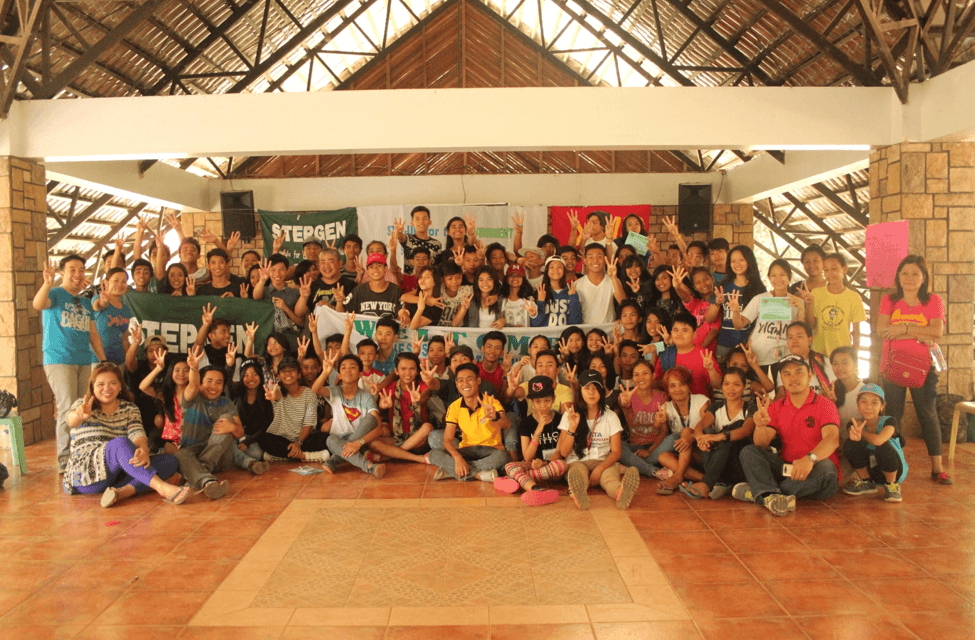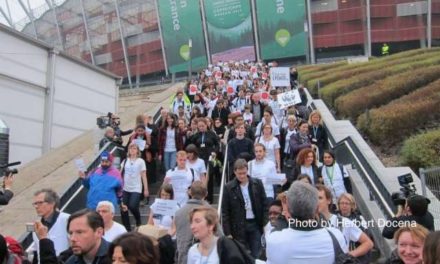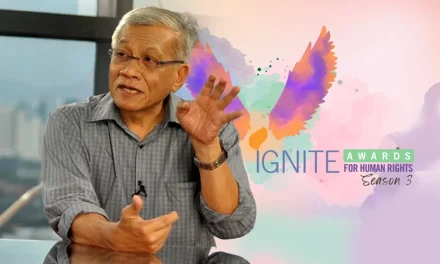Galileo de Guzman Castillo
WHY ENGAGE THE YOUTH? “The youth are agents for change. The youth are the hope of the present and next generations to come.”
In the interest of spreading environmental awareness while looking into building a broad network for climate and environmental justice among the youth, Focus on the Global South supported and participated in the four-day Summer Environmental Youth (SEY) Camp organized by the Struggle for Environmental Protection and Regeneration[i] (STEPGEN), together with Youth for Nationalism and Democracy[ii] (YND), and Teatrong Bayan[iii] (People’s Theater). The theme of SEY 2016 was “Step Up for the Environment, Stand Up for Our Future!” and was held from April 2 to 5, 2016 at Biak-na-Bato National Park, San Miguel, Bulacan. Experienced speakers and coordinators were invited to facilitate discussions, lectures, and workshops in order to develop environmentalism among the youth and help them nurture this interest through creative expression.
One of STEPGEN’s calls for action is for an environmentally-sustainable development and economic growth where dirty and dangerous technologies are replaced with sustainable ones (e.g. nuclear energy/coal plants with solar energy), wasteful practices are ended (e.g. the use of disposable non-biodegradable materials as opposed to recyclable ones), the production of more goods that can be used and not wasted, and where poverty and under-development is genuinely addressed. The organizers believe that environmental education, organizing, and mobilizing people, especially the youth, are crucial to saving the environment, in both the short-term and the long-term.
A LESSON IN HUMAN ECOLOGY: THE WEB OF LIFE. “STEPGEN is challenging the millennials to aspire for the common good and common future, an environment-friendly society that guarantees sustainable development for all.”
Around eighty (80) young student leaders and teachers from different secondary schools and communities in the National Capital Region, Central and Southern Luzon, participated in the event. They were grouped into eight tribes and were tasked to come up with their own tribal flag and chant. One of the camp’s aims is for the young leaders to collectively determine ways of how they can take a pro-active role in promoting environmental justice and protection. The organizers put a high premium on cooperation, teamwork, and camaraderie among the delegates. Another activity, The Web of Life (perhaps an introduction to Human Ecology), made the participants appreciate the connections between nature and humanity by linking different life forms and organisms found in the ecosystem to each other (using threads), understanding their ecological roles, and seeing the bigger picture of the human-environment interrelationships. Furthermore, the message that nature can survive without people but people cannot survive without nature was highlighted in this activity.
CREATING SOMETHING OUT OF NOTHING. “Starting now, we will use our art to show the people the revival and resurgence of nature!”
For the discussion and lecture sessions, keynote speakers and experts were invited to talk about climate and environmental justice concepts to equip the participants with an understanding about the current state of environment and the various issues and challenges it is confronting today.
Virgie Lacsa-Suarez, National Secretary General of Kilusan para sa Pambansang Demokrasya (KPD) lectured about the Global and National Environmental Situation, including discussions on the natural environment and human society, and the historical context of the global environmental crisis. According to her, historically, 78% of amphibians, 83% of reptiles, 44% of birds, and 64% of mammals are found in the Philippines and nowhere else in the world. But this is not the case anymore as we see the continuous deterioration of the Philippine ecosystem and ecological systems. Suarez also touched on the issue of global warming and climate change, the historical responsibilities of top carbon-emitting countries like the US, and what these mean to a vulnerable, developing, and low-emitting country like the Philippines.
THE YOUTH SPEAKS UP. “We do not want mining in our community. Nor dams and other destructive “development projects” that threaten our home, our nature.”
Veronica Cabe of the Nuclear-Free Bataan Movement (NFBM) and Coal-Free Central Luzon elaborated on particular environmental issues and concerns, and emphasized the following four points in her discussion: 1) There is no such thing as ‘clean coal’; 2) Destruction from mining is irreversible; 3) Nuke is not an option; and 4) The truth about false solutions (Carbon trading, REDD+) According to Cabe, the world is now in the eye of a perfect storm – and in the eye of this storm is climate change and global warming.
Lastly, Pines Arcega of Defend Zambales provided a community and grassroots perspective by speaking about her organization’s ongoing struggle and battle with coal plants and mining in the region. She added, “The underlying problem is the dominant economic model and the way we pursue development.” According to her, without addressing the root causes of the problem, we will never truly solve the climate crisis.
All speakers are members of the Philippine Movement for Climate Justice (PMCJ).
ARTISTS FOR CLIMATE JUSTICE. Using art imbued with social-political-ecological awareness as a form of activism.
To complement the learning of new concepts, the campers also learned to sing and play new songs that reignite the spirit of environmental activism among them. Some of the songs learned during this session were: Magkaugnay by Joey Ayala (Connected); Kapaligiran by Asin (Environment); and Bathala by Bagong Lumad (Deity). During the Community Singing and Sharing session, the participants sang Meron, Meron, Sinta (a play on the popular Philippine folk song, Leron, Leron Sinta); Dam by Gary Granada; and others. These creative learning sessions helped develop the spirit of volunteerism, leadership, camaraderie, and unity among the campers. They were able to easily understand and grasp climate justice concepts through the use of participatory, creative, and popular education.
During the solidarity night and pledge of commitment, the tribes merrily danced to a Joey Ayala-song, Karaniwang Tao (Ordinary Human). This song is popular among environmental activists as it talks about the travails of everyday life of an “ordinary human” as he/she confronts the climate crisis. The chorus goes: Karaniwang tao, saan ka tatakbo / Kapag nawasak iisang mundo / Karaniwang tao, anong magagawa / Upang bantayan ang kalikasan (translation: Ordinary human, where will you go / When our one and only world is destroyed / Ordinary human, what can you do / To guard the nature)
WE ARE ALL ARTISTS. The question is – what kind of artist are you?
Throughout the four-day camp, creative forms of art, including theatre arts and creative writing were taught to deepen further the interests and skills of the youth leaders. For the theater workshops alone, two days were allotted as the eight tribes were asked to prepare one dramatic play each that were later shown during the Night of Art and Gathering. The main facilitator and trainer for this part was Levy Balgos de la Cruz, a nationalist artist and seven-time Palanca Awardee.
Levy, fondly called ‘Tsong’ by his colleagues, gave a hands-on training on progressive art and people’s culture amidst the current environmental and social crisis. According to him, a cultural revolution is necessary to overcome the crisis we are now facing. He argued that the youth and student sector is the primary force for cultural activism – because they are the ones who are thirsty for knowledge, who are overflowing with energy, curiosity, and enthusiasm, and who are talented and cut across all the sectors of society. According to him, the national culture destroyed by the cultural aggression of the colonialists should be reinvigorated. This may be done through the use of effective art forms: drama, poetry, song, dance, story, writing, painting, visual arts, and others.
The last day of the camp was dedicated for STEPGEN planning that involved discussions on building broader networks and chapters within each home community of the youth leaders. As a cap-off activity, a symbolic ritual of tree planting was done as well as a heritage tour of the Biak-na-Bato National Park. At the end of the four-day activity, it was clear that positive values that promote social responsibility in protecting the environment were inculcated among the youth leaders. These values, hopefully, they would bring with them beyond SEY 2016.
SEY 2016 DELEGATES, FACILITATORS, AND ORGANIZERS – WHO'S NEXT? “A sustainable future built in harmony with the richness of life on Earth is possible.”
[i] STEPGEN is a transformative organization of the youth committed to the protection and rehabilitation of the environment. Through reorientation, education and cultural renewal, STEPGEN hopes to inspire the people to actively strive for the reversal of the environmental crisis brought about by global warming and climate change. For more info, see: https://www.facebook.com/STEPGEN-Struggle-For-Environment-Protection-and-Regeneration-1223444354334833/
[ii] YND is a national-democratic mass organization of the Filipino youth and students and a member of the Kilusan para sa Pambansang Demokrasya (KPD), a national democratic multi-sectoral alliance of mass organizations. For more info, see: https://www.facebook.com/yndph/
[iii] Teatrong Bayan is a comprehensive cultural organization that promotes a pro-people, mass oriented and scientific arts and culture. For more info, see: https://www.facebook.com/teatrongbayanph/









